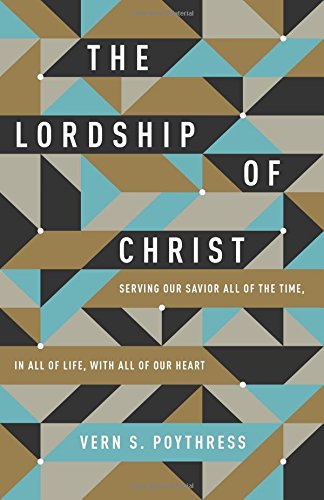Reviewed by Andrew J. Spencer
Over the past decades, Vern Poythress has been writing and publishing a surprising number of volumes on a variety of topics touching on bringing various areas of life under the lordship of Christ. His recent volume, The Lordship of Christ: Serving our Savior all of the Time, in All of Life, with All of our Heart, brings together many of the arguments from those volumes in a Neo-Kuyperian synthesis.
This book fits into the overall stream of conservative, Reformed theology as a well-researched, accessible introduction to living a full-throated, Christ-honoring lifestyle. It is the sort of work novice theologians want to do, but for which a lifetime of study, reading, and writing is necessary. There is nothing astonishing in this volume; it is solid fuel for progress toward holiness.
This volume is divided into twenty chapters, which are organized into four parts. Part One offers a baseline vision for authentically Christianity. Such Christianity is a radical call to obedience, focuses on the story of redemption, relies on the lordship of Christ over all of life, requires pursuit of knowledge pertaining to Christ and his will through Scripture, and stands in sharp distinction to the patterns of this world. The five chapters of Part One offer a biblical theology and demonstrate how that theology demands a response.
The second part outlines some of the resources for living life in radical obedience to Christ. Poythress begins with a sketch of spiritual resources available to all believers, like the Holy Spirit and various means of grace. He then offers suggestions for theological resources, particular from among the Reformers. Next he commends Abraham Kuyper and those in his tradition, whose basic perspective he is expounding throughout this volume. This section concludes with other helpful resources from the Reformed tradition, such as Van Tilian apologetics, biblical theology, and multiperspectivalism.
Part Three surveys particular areas in which Christians should apply Christ’s lordship. Poythress summarizes several of his volumes on redeeming academic disciplines into a distinct chapters and adds several other topics, using Kuyper’s legacy as a guide. First, Poythress explores the Kuyperian idea of religion that encompasses life-systems with and without explicit doxological elements. The next chapter commends ways of applying Christianity to politics, science, art, the future, education, and work. These brief chapters build on the Kuyper’s Lectures on Calvinism, showing ways these disparate human activities can be brought under the lordship of Christ.
The fourth part addresses possible pitfalls in seeking to bring all areas of life under the lordship of Christ. First he outlines traps of motivation. For example, Christians can do what seem to be the right actions for improper purposes: pride, building of our own kingdoms in God’s name, fear of man, despair, or defensiveness. Second, Poythress discusses the trap of using improper norms, whether they be due heterodoxy, legalism, a wooden interpretation of Scripture, or another source. Third, the book addresses traps related to wrongly dealing with situations by politicizing them, being overzealously Kuyperian (and thus insufficiently Christian), or improperly valuing the local church. Fourth, Poythress outlines traps related to perspectives on the future. The point in each of these chapters is that being faithful in living under the lordship in Christ is not a matter of taking particular practices to extremes, but constantly submitting to Christ’s lordship and correcting our courses toward holiness.
The Lordship of Christ could fall prey to criticisms along party lines. It is too Reformed (whatever that means), too dependent upon biblical authority, too uncritical of Kuyper and his legacy. This volume assumes a conservative theological perspective on Scripture, but it does not defend it at length. The book is realistically positive toward Kuyper and Kuyperianism, and it does not apologize for that. Poythress begins where he is, writes for a friendly audience, and explains how to live according to the worldview they generally accept. Readers who are seeking something else would do well to seek it elsewhere. Poythress has made defense of the presuppositions of this volume elsewhere.
The reader of this volume will find a handbook for living an integrated life. This would be a useful book to study in a weekly small group, or as part of an ongoing discipleship process. Poythress has crafted a book that belongs somewhere in the second wave of resources in discipleship: it assumes a basic doctrinal footing and is geared to moving someone toward the next level of spiritual maturity. This is the sort of book a new seminarian or college student would benefit from reading. This is an eminently practical book that takes the worldview outlined in Albert Wolters’ Creation Regained (2nd ed., Eerdmans: Grand Rapids, MI, 2005) and brings it down the the level of critical application. This is another outstanding resource by Poythress that belongs in the toolbox of professors, pastors, and lay leaders as they seek to grow their students or congregations to maturity.
Andrew J. Spencer is Associate Vice President for Institutional Effectiveness at Oklahoma Baptist University.
